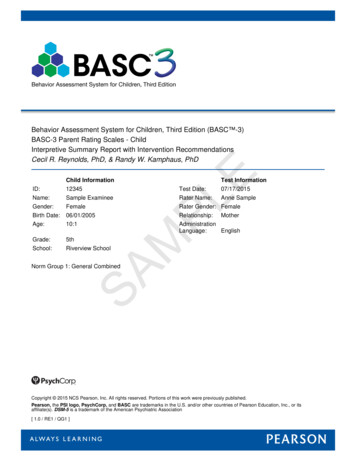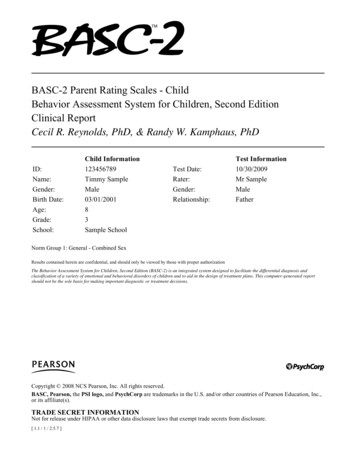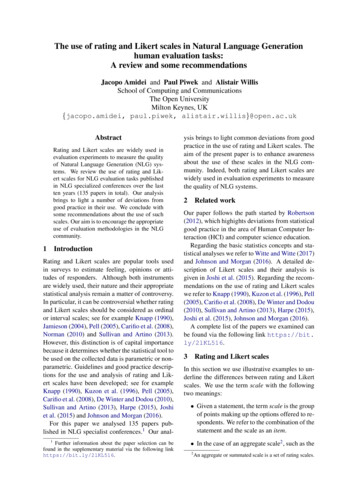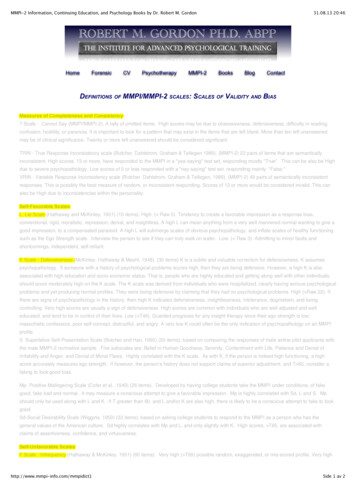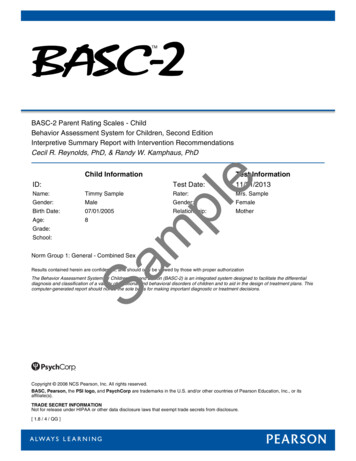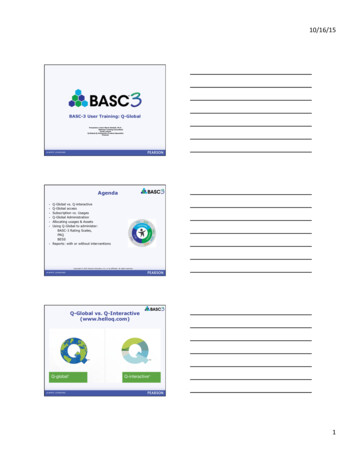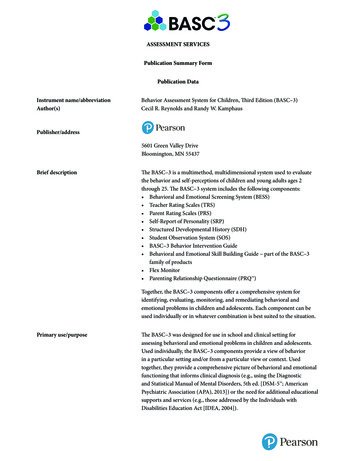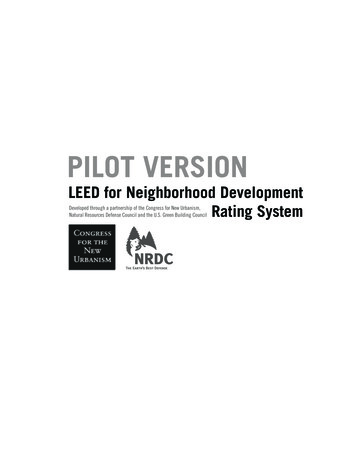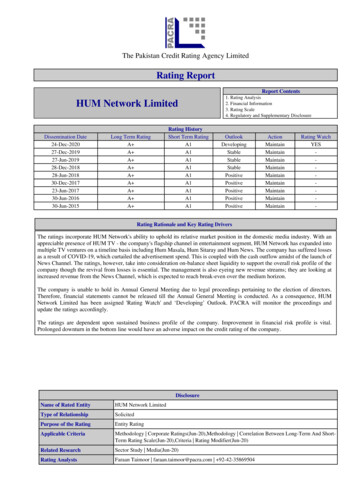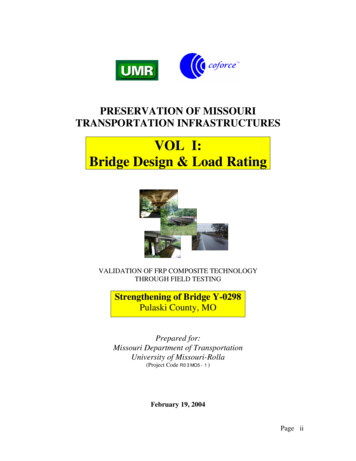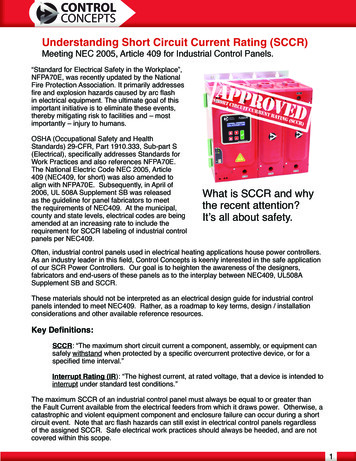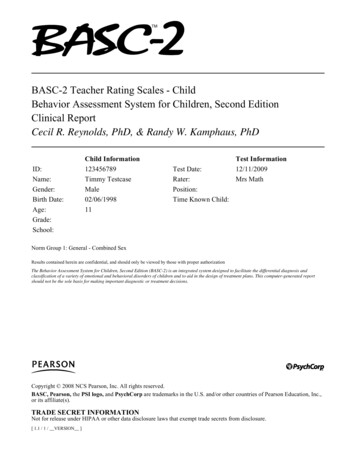
Transcription
BASC-2 Teacher Rating Scales - ChildBehavior Assessment System for Children, Second EditionClinical ReportCecil R. Reynolds, PhD, & Randy W. Kamphaus, PhDID:Name:Gender:Birth Date:Age:Grade:School:Child Information123456789Timmy TestcaseMale02/06/199811Test Date:Rater:Position:Time Known Child:Test Information12/11/2009Mrs MathNorm Group 1: General - Combined SexResults contained herein are confidential, and should only be viewed by those with proper authorizationThe Behavior Assessment System for Children, Second Edition (BASC-2) is an integrated system designed to facilitate the differential diagnosis andclassification of a variety of emotional and behavioral disorders of children and to aid in the design of treatment plans. This computer-generated reportshould not be the sole basis for making important diagnostic or treatment decisions.Copyright 2008 NCS Pearson, Inc. All rights reserved.BASC, Pearson, the PSI logo, and PsychCorp are trademarks in the U.S. and/or other countries of Pearson Education, Inc.,or its affiliate(s).TRADE SECRET INFORMATIONNot for release under HIPAA or other data disclosure laws that exempt trade secrets from disclosure.[ 1.1 / 1 / VERSION ]
BASC-2 Teacher Rating Scales - Child Clinical Report12/11/2009, Page 2ID: 123456789Timmy TestcaseVALIDITY INDEX SUMMARYF IndexResponse w Score: 0Raw Score: 104Raw Score: 4T-SCORE PROFILE30302020Gen.-Comb. 584779099809520679436334834024Adaptive Skills85T Score (Plotted)FunctionalCommunicationStudy Skills40Leadership40Social Skills50Adaptability50BehavioralSymptoms Index60Withdrawal60Atypicality70School ggression120Hyperactivity120PercentileGen.-Comb. Sex
BASC-2 Teacher Rating Scales - Child Clinical Report12/11/2009, Page 3ID: 123456789Timmy TestcaseTRS SCORE SUMMARY: General - Combined Sex Norm GroupComposite Score SummaryRaw ScoreT ScorePercentile Rank90% ConfidenceIntervalExternalizing Problems216739770-76Internalizing Problems181639058-68School Problems133689564-72Behavioral Symptoms Index380679464-70Adaptive Skills220432440-46DifferenceSignificance LevelFrequency ofDifferenceExternalizing Problems vs. Internalizing Problems100.01greater than 25%Internalizing Problems vs. School Problems-5NSExternalizing Problems vs. School Problems5NSComposite ComparisonsMean T score of the BSI63Mean T score of the Adaptive Skills Composite44Scale Score SummaryIpsative ComparisonRaw ScoreT ScorePercentileRank90% ConfidenceIntervalDifferenceSignificance LevelFrequency ofDifferenceHyperactivity28859981-89220.051% or lessAggression11679363-714NSConduct n6588452-64-5NSSomatization3547747-61-9NSAttention Problems21759971-79120.05Learning 1% or lessWithdrawal5526746-58-110.0510% or lessAdaptability14473641-533NSSocial Skills10453340-501NSLeadership8494843-555NSStudy Skills230325-35-140.05Functional Communication21494044-545NS5% or less1% or lessNote: All classifications of test scores are subject to the application of the standard error of measurement (SEM) when making classification decisions. Individualclinicians are advised to consider all case-related information to determine if a particular classification is appropriate. See the BASC-2 Manual for additionalinformation on SEMs and confidence intervals.
BASC-2 Teacher Rating Scales - Child Clinical Report12/11/2009, Page 4ID: 123456789Timmy TestcaseCLINICAL VALIDITY SUMMARYThe BASC-2 F Index is a classically derived infrequency scale, designed to assess the possibility that arater has depicted a child's behavior in an inordinately negative fashion. The F Index consists of itemsthat represent maladaptive behaviors to which the rater answered "almost always" and adaptivebehaviors to which the rater responded "never."The F Index produced from the ratings of Timmy by the teacher falls within the Acceptable range anddoes not indicate the presence of negative response distortion.The Consistency Index identifies situations when the rater has given inconsistent responses to items thatare typically answered in a similar way, based on comparisons made to raters from the generalpopulation. The Consistency Index was designed to identify ratings that might not be easily interpretabledue to these response discrepancies.The Consistency Index produced from the ratings of Timmy by the teacher falls within the Acceptablerange, and indicates the rater consistently answered items when completing the rating form.
BASC-2 Teacher Rating Scales - Child Clinical Report12/11/2009, Page 5ID: 123456789Timmy TestcaseSCALE SUMMARYThis report is based on Mrs Math's rating of Timmy's behavior using the BASC-2 Teacher RatingScales form. The narrative and scale classifications in this report are based on T scores obtained usingnorms. Scale scores in the Clinically Significant range suggest a high level of maladjustment. Scores inthe At-Risk range may identify a significant problem that may not be severe enough to require formaltreatment or may identify the potential of developing a problem that needs careful monitoring.Externalizing ProblemsThe Externalizing Problems composite scale T score is 73, with a 90 percent confidence-interval rangeof 70-76 and a percentile rank of 97. Timmy's T score on this composite scale falls in the ClinicallySignificant classification range.Timmy's T score on Hyperactivity is 85 and has a percentile rank of 99. This T score falls in theClinically Significant classification range, and usually warrants follow-up. Timmy's teacher reports thatTimmy engages in an unusually high number of behaviors that are adversely affecting other children inthe classroom. These behaviors are reported to be disruptive and indicate that Timmy is having aproblem maintaining his self-control.Timmy's T score on Aggression is 67 and has a percentile rank of 93. This T score falls in the At-Riskclassification range, and follow-up may be necessary. Timmy's teacher reports that Timmy sometimesdisplays aggressive behaviors, such as being argumentative, defiant, and/or threatening to others.Because aggressive behaviors in children often are present with other externalizing behaviors and withdiminished social relations, even moderately elevated Aggression scores such as this may warrantintervention.Timmy's T score on Conduct Problems is 64 and has a percentile rank of 90. This T score falls in theAt-Risk classification range, and follow-up may be necessary. Timmy's teacher reports that Timmysometimes engages in rule-breaking behavior, such as cheating, deception, and/or stealing.Internalizing ProblemsThe Internalizing Problems composite scale T score is 63, with a 90 percent confidence-interval rangeof 58-68 and a percentile rank of 90. Timmy's T score on this composite scale falls in the At-Riskclassification range.Timmy's T score on Anxiety is 69 and has a percentile rank of 95. This T score falls in the At-Riskclassification range, and follow-up may be necessary. Timmy's teacher reports that Timmy sometimesdisplays behaviors stemming from worry, nervousness, and/or fear.Timmy's T score on Depression is 58 and has a percentile rank of 84. Timmy's teacher reports thatTimmy displays depressive behaviors no more often than others his age.Timmy's T score on Somatization is 54 and has a percentile rank of 77. Timmy's teacher reports thatTimmy complains of health-related problems to about the same degree as others his age.
BASC-2 Teacher Rating Scales - Child Clinical Report12/11/2009, Page 6ID: 123456789Timmy TestcaseSchool ProblemsThe School Problems composite scale T score is 68, with a 90 percent confidence-interval range of64-72 and a percentile rank of 95. Timmy's T score on this composite scale falls in the At-Riskclassification range.Timmy's T score on Attention Problems is 75 and has a percentile rank of 99. This T score falls in theClinically Significant classification range, and usually warrants follow-up. Timmy's teacher reports thatTimmy has significant difficulty maintaining necessary levels of attention at school. The problemsexperienced by Timmy are probably interfering with academic performance and functioning in otherareas.Timmy's T score on Learning Problems is 58 and has a percentile rank of 80. Timmy's teacher reportsthat Timmy does not have unusual difficulty comprehending and completing schoolwork.Behavioral Symptoms IndexThe Behavioral Symptoms Index (BSI) composite scale T score is 67, with a 90 percentconfidence-interval range of 64-70 and a percentile rank of 94. Timmy's T score on this composite scalefalls in the At-Risk classification range. Scale summary information for Hyperactivity, Aggression,Depression, and Attention Problems (scales included in the BSI) has been provided above. Scalesummary information for the remaining BSI scales is given next.Timmy's T score on Atypicality is 43 and has a percentile rank of 20. Timmy's teacher reports thatTimmy generally displays clear, logical thought patterns and he is generally aware of his surroundings.Timmy's T score on Withdrawal is 52 and has a percentile rank of 67. Timmy's teacher reports thatTimmy does not avoid social situations and appears to be capable of developing and maintainingfriendships with others.Adaptive SkillsThe Adaptive Skills composite scale T score is 43, with a 90 percent confidence-interval range of 40-46and a percentile rank of 24.Timmy's T score on Adaptability is 47 and has a percentile rank of 36. Timmy's teacher reports thatTimmy is able to adapt as well as most others his age to a variety of situations.Timmy's T score on Social Skills is 45 and has a percentile rank of 33. Timmy's teacher reports thatTimmy possesses sufficient social skills and generally does not experience debilitating or abnormalsocial difficulties.Timmy's T score on Leadership is 49 and has a percentile rank of 48. Timmy's teacher reports that,when compared to others his age, Timmy demonstrates a typical level of creativity, ability to work underpressure, and/or an ability to bring others together to complete a work assignment.Timmy's T score on Study Skills is 30 and has a percentile rank of 3. This T score falls in the ClinicallySignificant classification range, and usually warrants follow-up. Timmy's teacher reports that Timmydemonstrates weak study skills, is poorly organized, and has difficulty turning in assignments on time.
BASC-2 Teacher Rating Scales - Child Clinical Report12/11/2009, Page 7ID: 123456789Timmy TestcaseTimmy's T score on Functional Communication is 49 and has a percentile rank of 40. Timmy's teacherreports that Timmy generally exhibits adequate expressive and receptive communication skills, and thatTimmy is usually able to seek out and find new information when needed.
BASC-2 Teacher Rating Scales - Child Clinical Report12/11/2009, Page 8ID: 123456789Timmy TestcaseBASC-2 TRS-C INTERVENTION SUMMARYNote. Information contained in the Intervention Summary section of this report is based on the BASC-2 Intervention Guide,authored by Kimberly J. Vannest, Cecil R. Reynolds, and Randy W. Kamphaus.Primary Improvement Areasl Hyperactivityl Attention Problemsl Study Skills (AcademicProblems)Secondary Improvement Areasl Anxietyl AggressionlAdaptive Skill Strengthsl NoneConduct ProblemsTimmy's scores on Hyperactivity, Attention Problems, and Study Skills (Academic Problems) fall in theclinically significant range, and probably should be considered among the first behavioral issues toresolve.Note that Timmy has scores on Anxiety, Aggression, and Conduct Problems that are areas of concern.Interventions for these areas are not provided in this report. However, these areas may require additionalfollow up.Timmy's BASC-2 profile indicates significant problems with Hyperactivity, Attention Problems, andStudy Skills (Academic Problems). Based on Mrs Math's ratings, Timmy is experiencing problems withthe following behaviors:Hyperactivityleaving seatl disrupting othersl being overly activel acting without thinkingl interrupting othersl having poor self-controll not waiting for turnl seeking attentionlAttention Problemsstaying focusedl paying attentionl listening welll
BASC-2 Teacher Rating Scales - Child Clinical Report12/11/2009, Page 9ID: 123456789Timmy TestcaseStudy Skillsstudying welll readingl staying organizedl completing homeworkl making up assignmentslPrimary Improvement Area: HyperactivityHyperactivity problems are considered to be one of Timmy 's most significant behavioral and emotionalareas to address. Hyperactivity is characterized as overactivity or excessive task-irrelevant physical (i.e.,motor) movement. Children and adolescents with hyperactivity often make noises at inappropriate times,leave their assigned seats without permission, and talk during times designated for silence in theclassroom. Hyperactivity problems can occur alone or can co-occur with attention problems and areusually exhibited by children in both home and school settings.There are a variety of interventions that have been shown to reduce, or have shown promise forreducing, hyperactive behavior, including:lFunctional AssessmentlContingency ManagementlParent TraininglSelf-Management of HyperactivitylTask ModificationlMultimodal InterventionsDetailed summaries of the Contingency Management and Self-Management intervention strategies areprovided below. See the BASC-2 Intervention Guide for additional detail about these strategies, alongwith the other intervention strategies listed above.Hyperactivity Intervention Option 1: Contingency ManagementIn contingency management for hyperactivity, behavioral interventions are used to modify consequentevents (i.e., events that occur after the behavior) that are often maintaine
BASC-2 Teacher Rating Scales - Child Clinical Report ID: 123456789 12/11/2009, Page 5 Timmy Testcase. School Problems The School Problems composite scale T score is 68, with a 90 percent confidence-interval range of 64-72 and a percentile rank of 95. Timmy's T score on this composite scale falls in the At-Risk classification range. Timmy's T score on Attention Problems is 75 and has a .File Size: 340KBPage Count: 48
